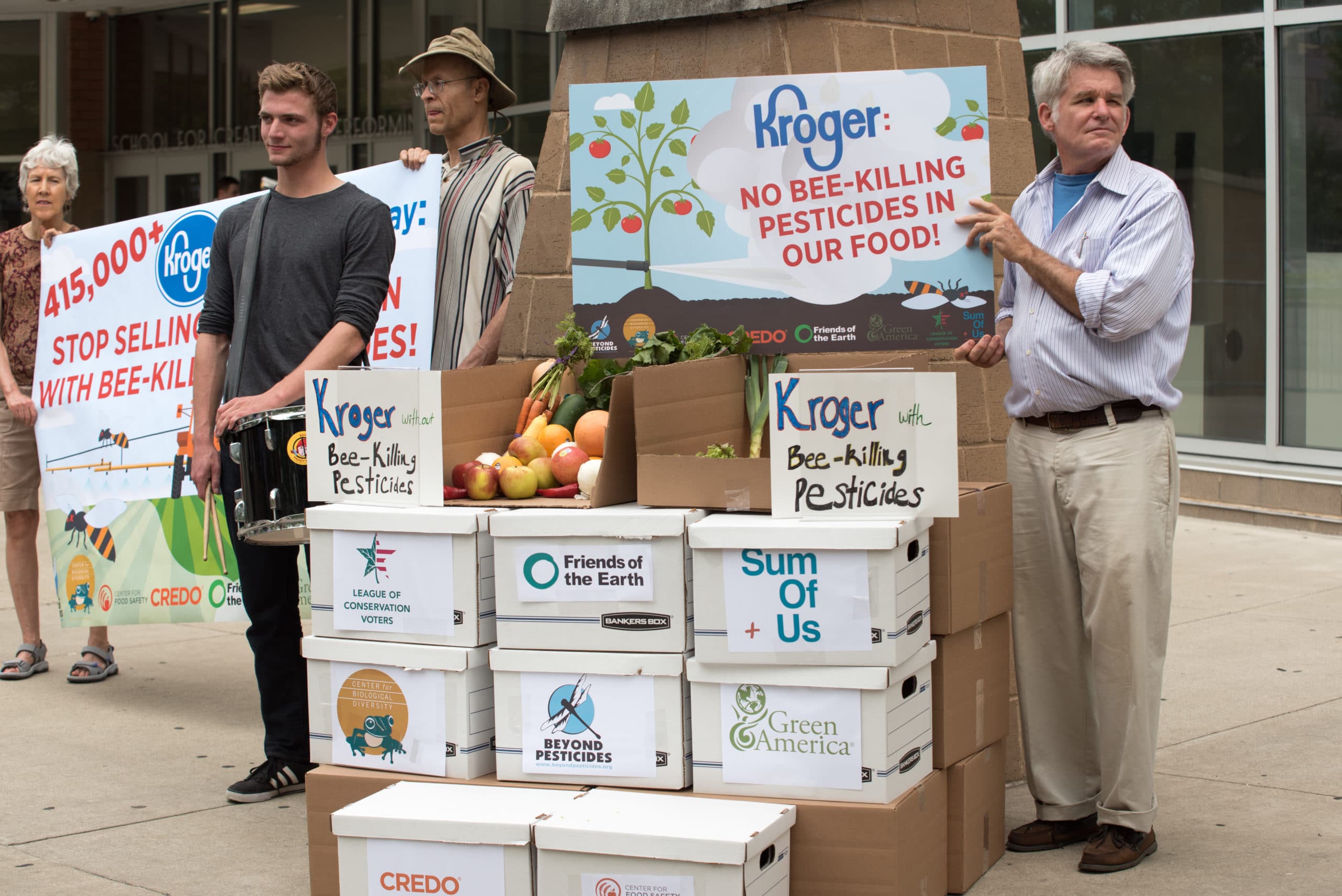- Blog
- Food & Agriculture
- Bee Action
- America’s Largest Traditional Supermarket Chain Is Fine With Killing Bees
America’s Largest Traditional Supermarket Chain Is Fine With Killing Bees

Donate Now!
Your contribution will benefit Friends of the Earth.
Stay Informed
Thanks for your interest in Friends of the Earth. You can find information about us and get in touch the following ways:
Kroger must take action as critical pollinators face alarming population decline.
by Tiffany Finck-Haynes, food futures campaigner
Originally posted on AlterNet.
More and more consumers are choosing to go organic when it comes to the food and products they buy. The science is clear that organic is better for our health, our families and our communities. But going organic can also help an essential part of our food systems: bees and other pollinators.
Bees are responsible for one out of every three bites of food we eat. They are essential elements of our ecosystem and a key part of our food supply chain. Without bees, grocery stores would run out of some of our most important and nutritious foods. Simply put, without bees, we do not eat. Unfortunately, bee populations are declining at an alarming rate. A growing body of scientific evidence shows us that toxic pesticides, and specifically neonictinoids, are to blame.
The key to protecting bees and other pollinators is twofold: we must reduce the use of neonics and other toxic pesticides, and we must increase our consumption of organic foods. Because organic food is produced without the vast majority of synthetic pesticides, buying organic means helping to protect the pollinators who are an essential part of our food system.
Conventional, non-organic food production relies heavily on synthetic pesticides, including the neonic pesticides that are devastating to pollinator populations. Organic certified farming uses dramatically fewer pesticides than conventional farming and is markedly better for the health of pollinators. Studies show that organic agriculture supports up to 50 percent more pollinator species than chemical-intensive, industrial agriculture. Organic farming also protects the health of consumers, farmers, farmworkers and rural communities by eliminating the use of highly toxic pesticides.
Food retailers have a crucial role to play in advancing a food system that is sustainable and protects bees and other pollinators. Retailers’ purchasing practices can support organic farmers who are using fewer toxic pesticides. American consumers are looking to their supermarkets to make these changes, and a majority of them believe that neonictinoids should be eliminated from agriculture.
Under increasing pressure from activists, some of the world’s largest retailers have taken steps to phase out the sale of plants and products that are grown with neonic pesticides. Retail giants like Home Depot, Lowe’s and Walmart have announced that they will phase out harmful neonics from their shelves.
Unfortunately, the country’s largest traditional supermarket chain has been silent on this issue. With over 2,700 stores in 31 states across the country, Kroger has tremendous power to protect pollinators and support a sustainable food system. Kroger can and should set the example for other supermarkets and food retailers, and give their customers what they’re looking for: more organic choices with fewer toxic pesticides.
Considering the size of Kroger’s supply chain and the range of suppliers that work with the supermarket, Kroger could make a huge contribution to improving pollinator health and building a more sustainable food system by working to phase out pollinator-toxic pesticides. A commitment of this magnitude and importance would not only be a boon for the people and the pollinators who bring food to our tables, but it would help protect Kroger’s supply of a range of important foods.
Last year, Friends of the Earth released a report and scorecard titled “Swarming the Aisles: Rating top food retailers on bee-friendly and organic food.” The scorecard assesses where the country’s top 20 food retailers stand regarding policies that protect people and pollinators. Kroger received an “F” grade for pollinator protection policy, along with 16 other companies of the 20 that were evaluated. It is clear that despite demand for pesticide-free food, and increasing evidence that toxic pesticides are devastating to bee populations, very few major food retailers have adopted specific policies that protect bees and other pollinators.
With bee populations continuing to decline, our food system, indeed our entire economic security, is at risk. It is time for Kroger to take a stand and be a leader in the industry on this issue. Starting August 26, Friends of the Earth members across the country will take to their local Kroger store to ask the retail giant to stop selling food grown with bee-killing pesticides.
Join us at your local store and help us protect these essential pollinators.
